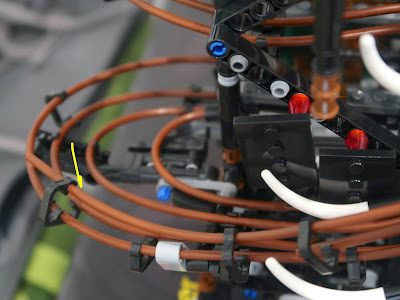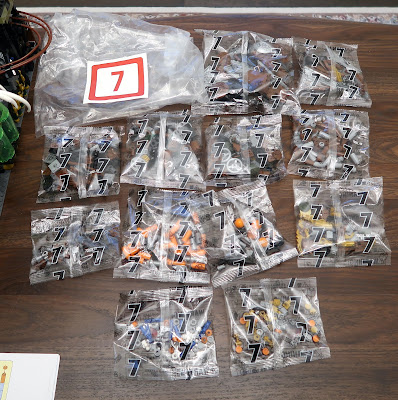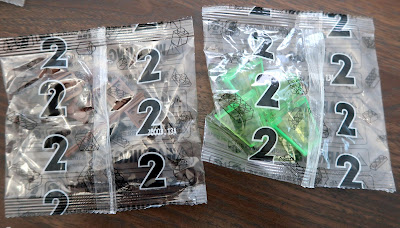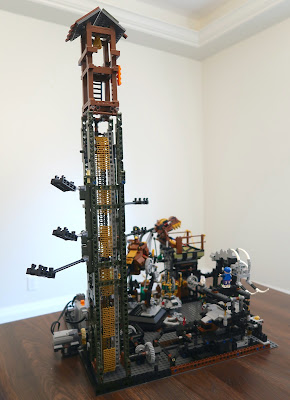Hi brick fans,
Welcome to my blog post about the new Kickstarter funded JMBricklayer Steampunk Dinosaur Factory Marble Run. It's got a whopping 5391 pieces and comes with a battery pack and two motors to power all the dynamic features of the set, such as the two working elevators, the moving staircases and the spinning dinosaur!
If you are interested to know more about the JMBricklayer Kickstarter program for the Marble Run set, you can find the link here. The Super Early Bird and Early Bird pledge funding has already completed but there is still a special discount happening right now.
JMBricklayer a leading global provider of Lego compatible brick sets was so kind to furnish me with an advance preview copy of the Marble Run set, which I had the pleasure of building and testing.
This is my Part 2 post, a continuation of my previous blog post which is Part 1 which you can find here. I also did an unboxing blog post which you can find here, if that interests you. Part 1 looked at the first four stages of the construction of the marble run. This post will look at the final stages 5 through 7 of the build.
Stage 5 of 7
For this stage we are working from instruction manual B. This stage will focus on building the Lava tubes and it's associated supporting structure and the corkscrew elevator.
Here are all of the parts bags for stage 5. There are 23 numbered bags: 70003-59, 59A, 60, 60A, 61, 61A,
62, 63, 64, 65, 66, 67, 68, 69, 69A, 70, 71, 72, 73, 74, 75, 76, and 77.
In stage 5, we will be constructing the following features:
Lava tunnels and supporting structure (pages 175 thru 220)
Marble Run track holders (pages 188 thru 191, 216 thru 218)
Corkscrew Elevator (pages 221 thru 233)
The multi-level orange Lava tubes and requisite scaffolding structure are installed right next to the vertical lift tower. Marbles will come out of the vertical lift and fall into the lava tubes, which are a series of connected ramps. At the moment we can only drop marbles into the lava tube to make sure they come out the bottom. Once the track is in, we will have to do more thorough testing.
As part of the scaffolding support, we also add extensions and clips whose purpose is to hold the marble run track in place. The track will be installed in the next stage.
The next component to be built is the corkscrew elevator. First you build the long central shaft. I forgot to take a picture of it while I was working on it, so here is the diagram from the instruction manual.
You then wrap a hose around the central shaft. It took me awhile to figure out how the hose wraps around the center shaft properly. As the instructions suggest, you need to pay close attention here.
Here's a closer look at the corkscrew tower during it's assembly. I did a preliminary test of the corkscrew and it's really neat to see it in action.
The transparent green windows allows one to watch the future marbles as they ascend to the top of the tower.
In the above picture, you can see the multiple track holder extensions that protrude from the main structure.
Stage 6 of 7
Moving on to stage 6, let's take a look at the parts inventory. There are 14 bags numbered as follows: 70003-78, 79, 80. 81, 82, 83, 84, 85, 86, 87, 88, 89, 90, and 90A.
Stage 6 will continue adding more supporting infrastructure, especially along the exterior of the corkscrew elevator, and the installation of additional track holders. This will pretty much encompass pages 234 through 273. After that, the remainder of the instructions for this stage are basically laying the track all around and through the marble run structure (pages 274 thru 304).
Here's a look at the flexible tubing that is used for the marble run track. It comes in 4 different lengths and to ensure you have enough track , the manual specifies which length of track you need to use to cut down to the proper size.
Laying the track was a bit time consuming so I didn't really take many pictures during this stage. Once you have laid all the track, you have basically completed all of the functional components. Feel free to have some fun now and try out the marble run track, elevators and steps!
All of the components you need to build in the last stage 7, are basically cosmetic, so now is probably the best time to start your marble run testing.
The marble run set provides you with 10 orange "marbles" which are Lego compatible basketballs.
For the the testing of the Marble Run, I will make a third and final blog post, where I point out some useful tips and tricks on how to increase your enjoyment of the set. I will also show you some of my modifications, like my custom ball holder which can be attached to the frame so that it's easier to collect and store your marbles for your next run.
Anyways, we will look at the final stage 7 and see what other neat elements we can add to the set.
Stage 7 of 7
For the final stage we have 12 bags of parts, numbered sequentially from 70003-91 thru 70003-102.
As I mentioned previously, the rest of the elements are just the icing on the cake. Let's look at all of the cool elements now.
There are two pallets of pipes (pages 305 thru 309). Place them where you like or follow the instructions.
Two pallets of covered barrels (pages 310 thru 311). Place them where you like or follow the instructions.
A rotating Laser gun, needs to be mounted as per the instructions (pages 312 thru 314).
Flying dinosaur needs to be mounted over top of the corkscrew elevator, so that it can rotate. (pages 315 thru 324)
And finally there are two working cranes. They can rotate, and raise and lower their loads using the string reel. (pages 325 thru 339.
The quality of the bricks is excellent and as you can see from the pictures, the marble run looks amazing. Brick clutch is excellent with just a few minor issues with the track holders not staying in place, but they can be easily pressed back in.
The marble run set is quite challenging but if you follow the instructions correctly, it can be a very rewarding experience, especially when you see that the marbles are making their way through the tracks and obstacles. Definitely my favourite parts of the sets are the two elevators that lift the marbles up to the top, followed by the dinosaur themed steps. Other notable features include the spinning pterysaur which looks like it had just escaped captivity. If you love steampunk and dinsoaurs, you will definitely want the marble run set in your collection.
Ok, that's a wrap for this blog post. Hope you have found the information helpful. Once I have created the tricks and tips blog post, I'll update the link here.
Don't forget to check out the
JMBricklayer website and visit their
Facebook and
Instagram pages to participate in their promotions and monthly contests where you can win free sets and get exclusive discount codes up to 60% off. For the non sale sets, you can use my special discount code itsnotlego15% to save an extra 15% off.
Thanks for looking! Bye for now!





























































